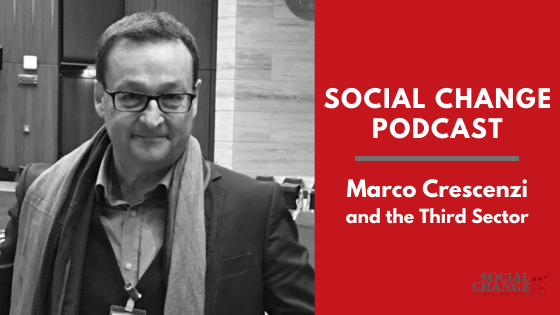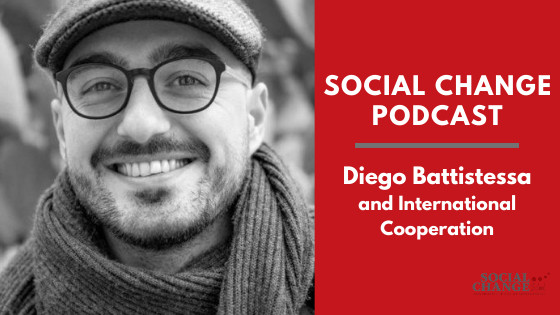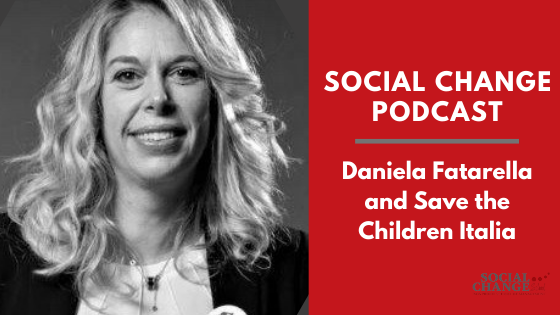From Episode Zero of Social Change Podcast, with Marco Crescenzi, Founder and President of Social Change School.
Social Change Podcast: International cooperation, NGOs and third sector to replan the future, the stage back to the protagonists of the sector.
Stefano Lepre: The first voice you are going to hear is not of a guest, but we have now the pleasure to have with us the President of the Social Change School, Marco Crescenzi, born in Rome, lived for many years in London and from 2015 living in Madrid.
Andrea Dasti: Marco, the Social Change School, founded by you in 1997, is the institution promoting this podcast, could you tell some words about…
Marco Crescenzi: Good morning to everyone! I am really happy for this project, an idea that comes from the managers of the sector.
As you know the Social Change School is an international institution of social “trans-formation”, where formation is seen as “leverage” for social change. The school is leader in managerial education for the no-profit sector and has formed many managers and the professionals currently working in the sector, thanks to a blended learning formula, introduced in 1998 with the course being in part in presence, in part e-learning.
The impact the School had is then made thanks to the one-year masters courses we teach in English: Fundraising (FRAME), Humanitarian Operation in Emergencies (HOPE) and Project Management for International Cooperation (PMC). We also have a part of our lessons happening in the southern part of the world, with local partners and education of local managers. In fact, the School supports the organizations and their leaders in different ways and it is part of the policy making process for the third sector, acting like a connector for organizations and their managers. We have always been active also on the editorial point of view from 1998, with the book ‘Il Manager del Nonprofit’, first of its kind in Europe, enlightening for the sector.
Interviewer: Let’s talk about the podcast more deeply. Where does the idea to propose the Social Change podcast come from and which kind of needs do you want to fulfil thanks to it?
Marco Crescenzi: This podcast is a small adventure started with different managers of the sector and different actors of social change. We want it to be about three main issues: The first one is culture of the third sector, the right one we need to create a huge impact.
The second issue is professionality, and the third one is the social impact that is the main reason all the organizations of the sector exist. These are three main issues that we need to work on with the goal of exchanging ideas within and outside the group of people already working in it, with a competent and interested public.
“Culture”, as the first issue to tackle, is really important. Peter Drucker, an American colleague, used to say “Culture eats strategy for breakfast” because not having a strong culture is like not having a piece of land where to plant your seeds and tree.
I clearly remember that when I wrote “Il manager del non-profit” in 1998 I started from a small yet fundamental consideration “Why do so many managers fail to say “thank you” to their collaborators?” Thanks to this small detail I discovered something amazing: the culture of the sector at the time was coming from a catholic-communist background that was having at the centre the idea of duty: if you work in the sector, you must dedicate yourself to the cause, because it is your duty, so why should I thank you…?
This idea was clearly making the investment in human resources shrink considerably making it even harder to value talent and merit. Another cultural element relative to the sector in the same period was the idea of the a kind manager who has to be ‘not homologated’ to a for-profit one (of course we mantain big differences!), and this blocked for so many years a growth in terms of professionality. During the late 90’ to make me understood I used to say to my colleagues, “If doctors have to be really prepared to work, also managers of the third sector have to be, by being prepared they will not lose their values!”
The professionality and the idea of talent are also strictly connected, because the professional growth of the workers should be supported not only for technical competences but also for soft and good skills, needed to be a good project manager or fundraiser, this issue still needs to be addressed because there is still a lot of room for improvement.
Skills like: ability to express gratitude, to create a positive environment, to handle stress, negotiate, public speaking, etc etc… are winning elements in all the research done, leading to 50% of success and are important as much as technical skills. If we do not invest in this, we will have problems in reaching our goals, and the impact we want.
We get to the third focus of the podcast, the social impact, the centre of the work of all the organizations, both big and small, with or without fundraising, international or just local, we all want to create a positive impact and external positivity.
The impact has to be measured with a good approach, understanding if one is more valuable than the other. Thanks to Esther Duflo and the MIT (Massachusetts Institute of Technology) we have a lot of research and information about it. Poverty Action Lab coordinated by her scientifically analyses the interventions in terms of impact with comparison groups. This foresees a lot of data collections. To work with big data is a scientific action we are still not used to realize, because we still do not know how to do it efficiently, and also this is part of our culture.
To sum up, the idea behind the podcast is to talk about the sector, exchange ideas and opinions involving actors of social change in order to make the culture of social change stronger and with wider borders, and improve professionality of managers and workers to have a bigger impact.
Interviewer: Marco, you just talked about the risks and the opportunities of the third sector in general, can you then tell us from your point of view which are the risks and the opportunities, being this episode zero, so an introductive space?
Marco Crescenzi: I would start by saying that the non-profit is a big sector that has many souls and cultures within. It is an economic, social and value infrastructure that links and unites our society.
Economic because, even if few people know, it produces a net value equivalent to the one produced by agriculture (in Italy: 4%, in EU more than 5%). More than 1 million people work in the no-profit sector (in Europe it is around 6%, US 6%).
Value-wise it is clearly important in the local areas and quarters both for big and small NGOs, with a core that it is part of society.
In the last 40 years, a lot of young people that wanted to be part of the political action or that wanted to bring their values, passed from the party point of view to the one of the third sector and associations.
Inside the nonprofit sector, there are different cultures and realities, like Greenpeace and other environmental movements that come from peace activism, or Caritas and the catholic organizations that are completely different.
For example we have Oxfam, that focuses on development projects, or other organizations that only focus on advocacy lobbying and rights campaigns like Amnesty. Or Save The Children that acts on particular targets, like children and teenagers, organizations like Fairtrade that focuses on local development and fair trade. There are NGO with one specific objective, like INTERSOS that focuses on humanitarian action, or Peter Pan Association, that takes care of families with sick children and hosts them in case of need.
All these organizations are linked in the economic, social and value based infrastructure, that is created not only to be there when the state is not present but also produces development, like Fairtrade, that enables development at local level, or INTERSOS or Save The Children that work in Italy and abroad, creating opportunities for the people and not only supports for recovery in emergency.
Interviewer: What is the actual state of the no-profit system after one year and half of COVID pandemic?
Marco Crescenzi: The COVID and post-COVID period was stressing and intense but is bringing changes in the structure of the sector, especially for smart working, that is not only how many days to work from the office and how many days to work from home, but focuses on the goal-oriented work, and this brings us definitely towards a different relationship between employees and organizations.
In general, I would say that the current status of the sector is good, there is a rising in funds for some organizations and there is no particular crisis. There are clearly some critical situations where important changes in the structure have been done, like Oxfam International that had to terminate the contract of an important number of employees, but maybe it would have been the case also without the pandemic. The positive side is definitely the many opportunities created for different local actors to talk and share ideas during roundtables.
In Australia for example, a roundtable created for covid related project has been extend and used for projects in general, in order to keep the idea of meeting and sharing ideas together with foundations, companies and NGOs.
COVID was also an opportunity to learn new things and act fast in a new kind of emergency, keeping the objectives and starting a new way to relate to other organizations.
Interviewer: what was the response of the governments in the post-covid era towards non-profit organizations? There has been a raising or cutting of funds?
Marco Crescenzi: The funds are clearly raising, from Governments, Foundations and often Corporations, so from the financial point of view the perspective is good, and also for the support at local level many new collaborations were born between NGOs and local governments.
The Italian Prime Minister, Mario Draghi, received delegations from the third sector, firstly from organizations focusing on the climate crisis like “WWF” “Legambiente” and“Greenpeace” he listened to them. Our organizations are now working at local level focusing on new topics like food distribution (also Save the Children), creation of new structures and welcoming like “Intersos24” for non-accompanied minors. Also “Doctors Without Borders” (MSF) started to work on covid and support for this emergency also in Europe and Italy and not only abroad as usual.
There is a new cooperation actively looked after, as in the case of “Emergency”, that was contacted form the government to help the regional health system… Many organizations, differently form the usual, proactively looked for new ways to act and new collaborations. For example Save The Children for the first time directly distributed food and financial help to families in need, and tablets for free to fill the gap created by the educational poverty and e-learning, and “INTERSOS” created new progressives welcoming centers.
There has been a really strong collaborative action also in the northern countries where new poverty and new inequalities arrived.
Interviewer: Thank you Marco. Which risks you think there are right now in the no-profit sector? Do you think there are good opportunities? Which ones?
Marco Crescenzi: Of course. Starting from the risks, I truly believe there is little attention to the quality of human resources. Jim Collins, a management guru I like, says that “people are not the most important assets, the right people are”.
During recruitment processes, it is really important that the people selected are not only aligned with the values or with already developed technical competences, but also the ones with Talent and discipline. For this reason, one of the focuses of the school is to look for talents to prepare for the sector, we truly believe it is fundamental. So, not recruiting and developing talents can bring us to mediocrity. As Jim Colins says “Good is enemy of great’ in managements terms.
I would add another point: The sector definitely needs to work more on big data, to become more data-driven to analyse management, Key Performance Indicators, the impact of the interventions.
We definitely need to work on the collection and analysis of data also for new technologies like the blockchain, that is a new certification system that allows economic transactions like the ones we have now for money. But Block Chain also allows other kinds of certifications like the “result chain”, that focuses on the results of impact progressively produced.
Another important focus should be ecological sustainability, I think right now NGOs are not ready to create valid projects about it. One really relevant risk is that if NGOS are not prepared to produce results and prove it, there are many foundations started from for-profit companies and family endowments that think to be good enough in implementing projects and start to do the job of the no-profit organizations, becoming implementation foundations instead of being partners, they take charge of the intervention and act.
This risk should lead us to work in a better way as the third sector, since we already know how to work with certain beneficiaries and territories. We should avoid these new actors to come into the scene for our substitution, we are already there, we only need to move better and working together at the best.
Another point is that the sector now lacks this scientific approach based on design of the social impact. There is a new way of thinking, on impact results thanks to Esther Duflo of the MIT (Massachusetts Institute of Technology) with the J-PAL, and the Poverty Action Lab, that has a a scientific approach toward poverty in line with studies about social impact, using experimental groups and verifying the results of the interventions.
Interviewer: Marco, now I would love to focus on the topics and issues this podcast will address. You already talked about human resources research, social impact and blockchain… So what should a listener expect from the podcast programme?
Marco Crescenzi: We are going to address different transversal topics, such as: Woman entrepreneurship with some witnesses, job and occupational opportunities, with a special focus on international cooperation and third sector in general; the development of fair trade; the ecological transition; impact finance; design and management of social impact.
In the while we are going to focus on some challenges currently facing sector, such as doing social business, to go towards finance and to involve important investments for the better good,
Interviewer: Before ending the episode can you give us some information about the podcast? You talked about opportunities, which are in your opinion the ones coming from this space for the sector in this historical moment?
Marco Crescenzi: There are many opportunities, like big data, that we already talked about, that are fundamental for measuring social impact; I am convinced that we can also get better in other things, like recruitment and e-HRM.
The awareness of the current crisis, like the one of 2008, can guide us towards political awareness, like Oxfam has done since its foundation, that sees poverty not as a disgrace but as lack of power. This awareness can lead us to overcome some old logics like it happened in catholic organizations, that made huge changes in this, passing from only helping to a better focus on capacity building and empowerment.
Another huge opportunity is the relationship with for-profit and foundations. Right now every for profit company has a “Purpose”, really similar to our Mission, and it creates a better soil for cooperation with us, at least theoretically…
The so-called “Community Capitalism” it’s really interesting, because we are in an advanced phase of capitalism that should not be undervalued or not-considered as it is the same as “green washing” and similar; it does not make sense to use old schemes to comprehend and evaluate the transformation of this capitalism and the financial sector (social impact bond, green bond)
We are obliged and should be a pleasure to work with all the social actors with the idea of create social impact not only for funding and social intervention.
I have always been optimistic, and I see vitality of our sector that can allow us to create job opportunities for youth. These days it is time to focus on willingness but also and more on talent, to produce other changes. Good talent and strong values are fundamental.
Interviewer:
Marco, I would leave this last space to you to give us one last comment to say goodbye and see you next time to the listeners of our podcast.
Marco Crescenzi: Of Course. I often say “It is not about the world we are leaving to young people but the young people we are leaving to the world” because the youth will have to address the challenges of the future to change the world. This is what we do at Social Change School since 1997.




